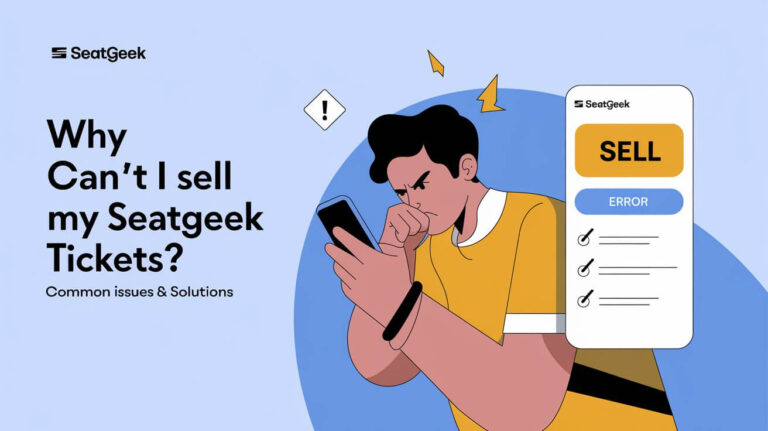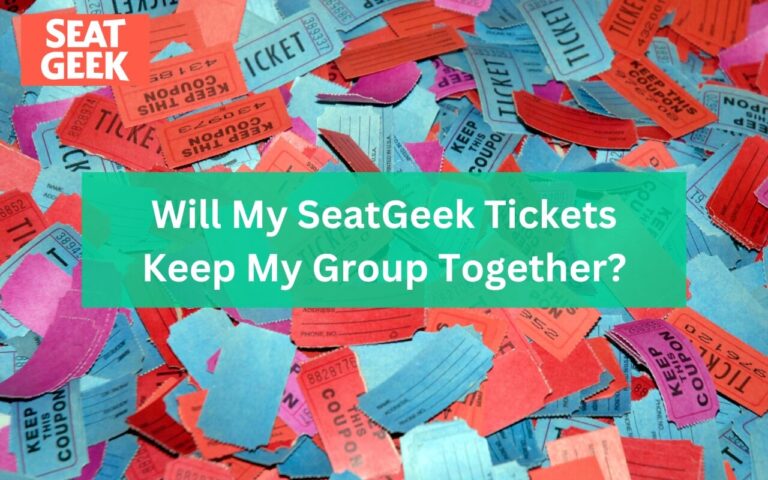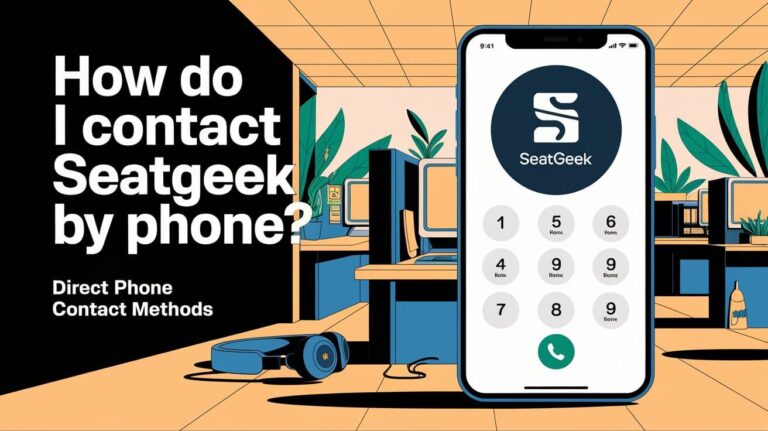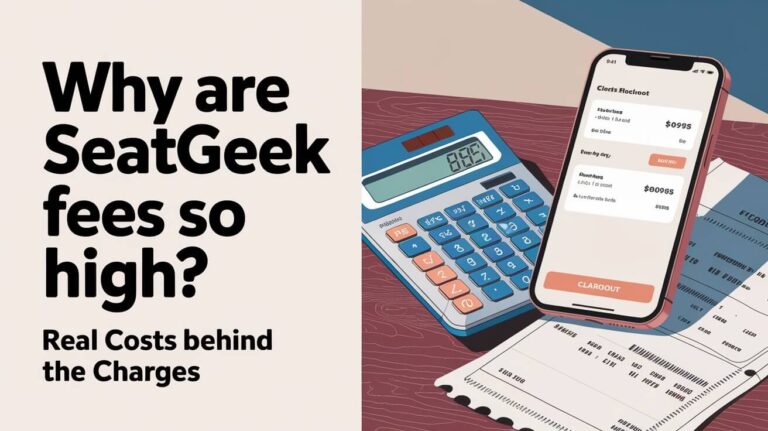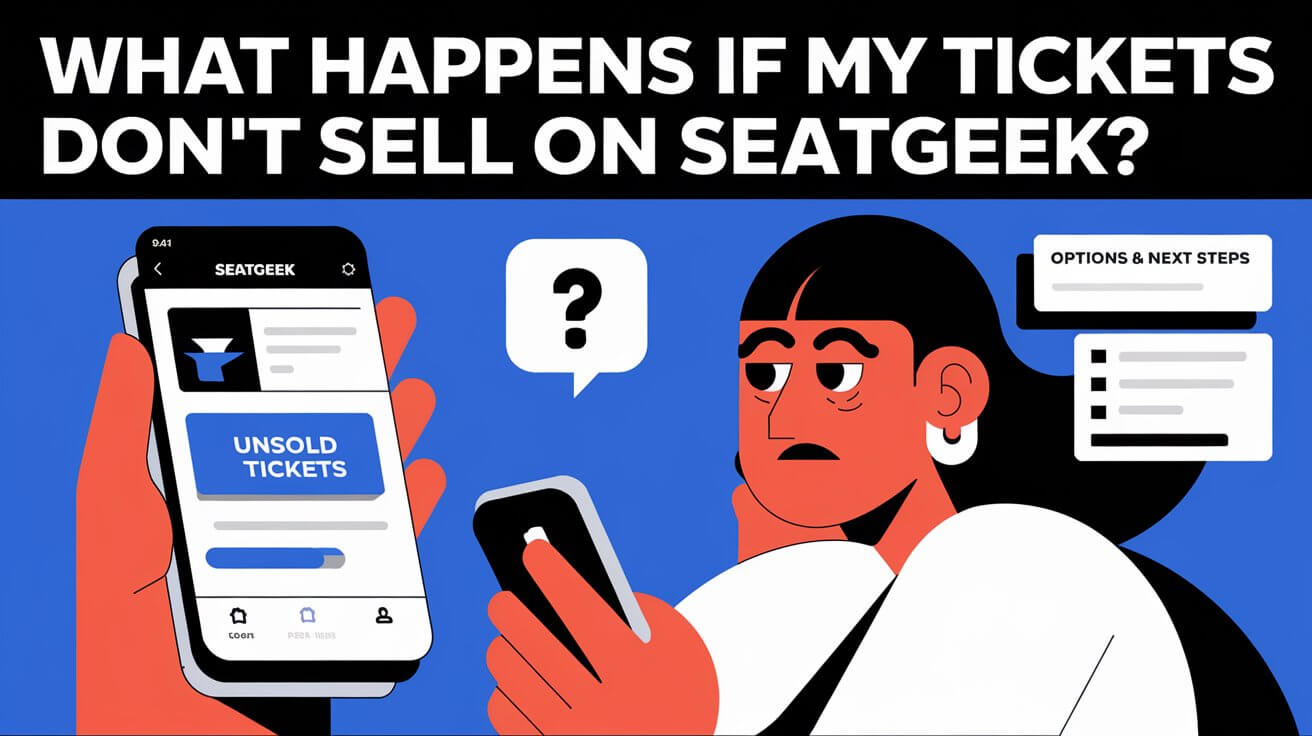
SeatGeek is a top choice for buying and selling event tickets. It’s popular among sports fans and concert-goers. But, understanding unsold tickets on SeatGeek can be tricky. We’ll explore the important details you need to know.
SeatGeek’s secondary market lets ticket owners sell their unsold tickets. This helps fans find last-minute seats. The company works with Paciolan to connect with sports teams and venues. Plus, its parent company, Learfield, has a big role in sports marketing, affecting ticket prices.
SeatGeek’s Secondary Market Structure and Operations
SeatGeek is a top secondary ticket marketplace. It’s different from traditional ticket sales. The platform has over 100 resellers and 150,000+ venues. This gives users a wide range of ticket options.
Primary vs Secondary Ticket Sales
SeatGeek buys unsold tickets and resells them for more. It uses special algorithms to set ticket prices. These prices are based on the ticket’s value, known as the “Deal Score.”
Platform Commission Rates
SeatGeek makes money by charging fees. Buyers might pay up to 50% of the ticket price. Sellers pay about 10% in fees. These fees help the company stay in business.
Market Pricing Algorithms
SeatGeek’s pricing algorithms are key. They look at sales history, event popularity, and seat quality. This ensures tickets are priced right and fair for everyone.
SeatGeek’s unique approach has made it a big name in event tickets. It offers a smooth way for buyers and sellers to deal with ticketing. This has changed how tickets are sold and bought.
What Happens If My Tickets Don’t Sell On Seatgeek
Selling event tickets on SeatGeek can be easy to do. But, what if your tickets don’t sell before the event? It’s important to know about SeatGeek’s rules for unsold tickets. This helps sellers set the right expectations and avoid being disappointed.
Unsold tickets on SeatGeek usually stay up until the event date. SeatGeek’s rules make it hard for sellers to take down listings once they’re up. So, even if your tickets don’t sell, they’ll still be on the platform until the event.
Sadly, sellers might not get their money back for unsold tickets. SeatGeek works on a consignment basis. This means you only get paid for tickets that sell. Any tickets that don’t sell won’t get a refund. It’s key to think about this when deciding how many tickets to list.
| SeatGeek Ticket Policies | Key Details |
|---|---|
| Unsold Ticket Removal | Tickets remain listed until the event date passes, making it difficult to delist them. |
| Refunds for Unsold Tickets | SeatGeek operates on a consignment basis, so sellers do not receive refunds for unsold tickets. |
| Ticket Transfer Process | Sold tickets are automatically transferred to the buyer’s account within 48 hours of the event. |
To avoid problems with unsold tickets, sellers should think carefully about their prices. They should only list tickets they’re sure they can sell. SeatGeek’s Deal Score technology can help find the best prices to sell tickets.
The Real Cost Behind SeatGeek’s Fee Structure
SeatGeek makes buying and selling tickets easy. But, its fees can add up, affecting both buyers and sellers. It’s key to understand these costs to use the secondary ticket market wisely.
Buyer Fee Breakdown
SeatGeek’s fees for buyers can be high, sometimes up to 50% of the ticket price. For example, a $100 ticket might cost a buyer $150 after fees. These fees pay for services like payment processing and customer support.
Seller Commission Analysis
Sellers pay a 10% commission to SeatGeek on each sale. This commission is taken from the sale price, lowering the seller’s profit. While it’s standard in the industry, sellers should consider it when setting ticket prices.
Hidden Charges to Consider
SeatGeek’s fees also include hidden costs like payment processing fees. These can add up, affecting the ticket’s final price and the seller’s earnings.
| Ticket Price | Buyer Fee | Seller Commission | Final Cost |
|---|---|---|---|
| $100 | $50 | $10 | $150 |
| $200 | $100 | $20 | $300 |
| $50 | $25 | $5 | $75 |
The table shows how SeatGeek’s fees affect ticket prices. Both buyers and sellers must think about these costs when using the secondary ticket market.
Ticket Removal and Account Management Policies
Managing tickets on SeatGeek can be tough for both buyers and sellers. The rules for removing tickets and handling account activities can be frustrating. This is true, mainly for sellers who need to change their listings.
Many users struggle with taking down ticket listings after posting them. Even when they contact customer support, sellers often face issues. This is a big problem for those who decide not to sell or find buyers elsewhere.
It’s important to know the limits of SeatGeek’s account management rules. Sellers should understand that removing tickets can be hard once they’re listed. This can make it hard to change sales plans or keep up with market changes.
Key Considerations for Ticket Sellers
- Read SeatGeek’s seller guidelines and account policies before listing tickets.
- Be ready for challenges in removing tickets, even if your plans change.
- Keep in touch with SeatGeek’s customer support for account help.
- Look into other ticket selling sites or methods if you need more control.
Good ticket management is key for both buyers and sellers in the secondary ticket market. While SeatGeek is easy to use, its rules on removing tickets and managing accounts can be tricky. Users should know these challenges before using the service.
SeatGeek’s Partnership with Major Venues and Teams
SeatGeek has teamed up with top sports teams and venues across the country. These partnerships give SeatGeek the right to sell tickets for many events. This makes it easy for fans to get tickets for sports and entertainment.
Integration with Sports Franchises
SeatGeek works with many professional sports teams, like the Baltimore Ravens. Fans can buy season tickets and single-game tickets through SeatGeek. It also offers features for game day, making it easy to manage tickets.
Venue Exclusive Deals
SeatGeek also has deals with big venues. It’s the main ticket seller for these places. This makes SeatGeek a go-to for fans looking for tickets to big events.
| Key SeatGeek Partnerships | Venue/Franchise |
|---|---|
| Exclusive Ticketing Provider | Baltimore Ravens (NFL) |
| Primary Ticketing Platform | Citi Field (New York Mets) |
| Preferred Ticketing Partner | New Orleans Saints (NFL) |
SeatGeek’s partnerships with sports teams and venues show its big role in ticket sales. It makes it easy for fans to get tickets to their favorite events.
Digital Ticket Management Systems
SeatGeek has made a big leap into the digital world of ticketing. They’ve teamed up with Paciolan to bring fans advanced ticket solutions. Now, fans can buy tickets online, download them on their phones, and manage them digitally.
Digital ticket systems bring fans a lot of convenience. They also help fight against fake tickets. SeatGeek makes sure every ticket is real, making everyone feel safe.
But, moving from paper tickets to digital ones can be tough for some fans. They miss the feel of holding a real ticket. SeatGeek is working hard to make the digital process easy and friendly for everyone.
SeatGeek is changing the game with digital tickets, mobile ticketing, and top-notch ticket technology. This change makes events better for fans and easier for venues to manage. It also makes ticketing more secure.
Revenue Sharing Between Venues and SeatGeek
SeatGeek teams up with venues and teams through complex revenue sharing deals. They split the profits from ticket sales on the secondary market. This helps schools or venues make extra money, supporting their operations.
Profit Distribution Models
The way profits are split can change based on the deal between SeatGeek and the venue or team. Things like the venue’s size and the event’s popularity play a role. By working with SeatGeek, venues can use smart pricing to make more money from unsold tickets.
Partner Benefits Structure
- Increased revenue generation potential through ticket resale partnerships
- Cost savings from the elimination of physical ticket production
- Environmentally friendly digital ticket solutions reducing paper waste
- Enhanced fan experience with seamless mobile ticket management features
- Flexible ticket delivery options to accommodate scheduling changes
SeatGeek’s revenue sharing and benefits offer a strong reason for venues and teams to partner. It helps them sell more tickets and improve the fan experience.
Ticket Pricing Strategies on SeatGeek
SeatGeek uses smart pricing to make the ticket market better. They look at how popular the event is, where the seats are, and how much people want them. This way, they set the best price for each ticket. Sometimes, tickets for big events can cost a lot more, while less popular seats are cheaper.
It’s important to know how SeatGeek sets ticket prices. This knowledge helps both buyers and sellers make better choices. They can find great deals or get more money for their tickets.
Factors Influencing Ticket Pricing
- Event Popularity: Tickets for big events, like concerts or sports games, cost more because more people want them.
- Seat Location: Seats closer to the action or with a better view are worth more and cost more.
- Market Conditions: SeatGeek’s system checks the market often and changes prices to keep ticket value right.
Dynamic Pricing Strategies
SeatGeek’s pricing changes with the market. They adjust ticket prices as demand goes up or down. This keeps ticket values fair and makes the ticket market better for everyone.
| Pricing Metric | Average Value | Range |
|---|---|---|
| Event Popularity | 75% of ticket value | 50% – 90% |
| Seat Location | 20% of ticket value | 10% – 30% |
| Market Demand | 5% of ticket value | 0% – 20% |
“SeatGeek’s dynamic pricing strategies allow us to ensure that ticket values accurately reflect the current market demand, providing a more efficient and transparent secondary ticket market for our users.”
Knowing how SeatGeek prices tickets helps buyers and sellers. They can find better deals or get more money for their tickets.
Sports Properties and Ticket Distribution Rights
Who owns sports teams affects ticket sales. Companies like Learfield manage sports marketing. This can change how fans buy tickets, making it harder to get them.
Corporate Ownership Impact
In 2017, the NFL started selling tickets openly. This move allowed companies like SeatGeek to sell tickets. It has helped sell more tickets, even with fees.
About 15 pro sports teams work with ticket brokers. For example, the Detroit Pistons sell around 800,000 tickets a year. But, they sell fewer tickets directly through Ticketmaster.
Rights Management Process
Tickets are sold on many platforms. You can buy them at Costco, on Groupon, or through apps. Even AI assistants help sell tickets now.
Amazon or Fanatics might join ticket sales soon. SeatGeek wants them to. Fanatics teamed up with TickPick, but they don’t sell many tickets.
Alternative Options for Ticket Sellers
SeatGeek is not the only place for ticket sellers. They can sell directly to fans, use team-specific ticket exchanges, or check other secondary market sites. Some fans like to buy from season ticket holders at face value, avoiding high fees.
Direct sales to fans are an option. This way, sellers can skip the fees of resale platforms. But, it takes more work to find buyers and handle the details.
Team-specific ticket exchanges are another choice. They might have lower fees and connect sellers with the team’s fans. These platforms have communities of fans buying and selling tickets for specific teams or events.
- Advantages of team-specific ticket exchange platforms:
- Lower fees compared to general ticket resale platforms
- Direct connection to the team’s fan base
- Potential for higher visibility and faster sales
- Examples of team-specific ticket exchange platforms:
- New York Knicks Ticket Exchange
- San Francisco 49ers Ticket Exchange
- Seattle Seahawks Ticket Exchange
There are also other secondary market sites like StubHub, Vivid Seats, and TickPick. Each has its own fees, policies, and audience. Sellers should look into these to find the best match for their needs.
| Platform | Commission Rates | Key Features |
|---|---|---|
| StubHub | 15% from sellers, 10% from buyers | Largest secondary ticket marketplace, buyer guarantee |
| Vivid Seats | 10% from sellers, 15% from buyers | Wide event coverage, mobile-friendly platform |
| TickPick | 0% from sellers, 10% from buyers | No hidden fees, transparent pricing |
The right ticket resale platform depends on what sellers value most. Fees, audience, and event specifics are key. By looking into these options, sellers can find the best way to make money and give buyers a good experience.
Season Ticket Holder Benefits and Considerations
Being a season ticket holder comes with special perks and early access to tickets. But, it also means dealing with rules about selling tickets. It’s important for fans to understand these rules to get the most out of their season tickets.
Season ticket holders get to buy tickets for popular games early. This means they can secure their seats before others. Teams also offer special deals and rewards to their season ticket holders, making fans feel closer to the team.
But, there are limits on selling season tickets on sites like SeatGeek. Fans might not be able to make money off high-demand games. Knowing these rules helps season ticket holders manage their tickets well and stay loyal to their team.
Frequently Asked Questions
What is the structure and operation of SeatGeek’s secondary market?
SeatGeek is a platform for buying and selling tickets. It works with Paciolan, a company used by many Division I schools. Learfield, SeatGeek’s parent, owns sports properties and advertising.
The platform uses algorithms to set ticket prices. This can lead to high prices on the secondary market.
What happens if my tickets don’t sell on SeatGeek?
Unsold tickets on SeatGeek stay listed until the event date. It’s hard to remove listings once they’re up. Sellers might not get refunds for unsold tickets.
It’s important to know these policies before listing tickets.
What is the real cost behind SeatGeek’s fee structure?
SeatGeek charges high fees for buyers and sellers. Buyers might pay up to 50% of the ticket price. Sellers pay a 10% commission.
There are also hidden fees like payment processing and currency conversion. These fees can greatly increase the ticket price.
What are SeatGeek’s ticket removal and account management policies?
It’s hard to remove tickets from SeatGeek once they’re listed. Sellers have trouble even with customer support. This can be frustrating for those who change their minds.
Knowing these rules is key for managing your account on SeatGeek.
How does SeatGeek’s partnership with major venues and teams work?
SeatGeek partners with big sports teams and venues, like the Baltimore Ravens. These partnerships can replace existing ticket systems. SeatGeek might become the main place for season tickets.
This makes ticket management easier but might limit fan options.
How do SeatGeek’s digital ticket management systems work?
SeatGeek uses digital ticket systems, often with Paciolan. These systems allow for online and mobile ticket purchases. They help fight ticket counterfeiting but can be hard for some fans to adjust to.
How does revenue sharing work between venues and SeatGeek?
SeatGeek shares profits with venues and teams through partnerships. This helps schools or venues make more money from ticket sales. The exact share depends on the agreement between SeatGeek and the venue or team.
What are SeatGeek’s ticket pricing strategies?
SeatGeek uses algorithms to set ticket prices based on demand and event popularity. This can lead to high prices for popular tickets. Less popular seats might be cheaper.
Understanding these strategies is important for both buyers and sellers.
How do sports properties and ticket distribution rights impact the ticketing process?
The ownership of sports properties affects ticket distribution. Companies like Learfield, SeatGeek’s parent, manage marketing and content. This influences ticket sales and distribution, impacting fans’ access.
What are the alternative options for ticket sellers beyond SeatGeek?
Sellers have other ways to sell tickets, like direct sales or team-specific platforms. Some fans prefer buying from season ticket holders at face value. This avoids the high fees of secondary market sites.
What should season ticket holders consider when it comes to ticket resale and management?
Season ticket holders have special considerations for resale and management. They often have priority but might face resale restrictions. It’s important to understand the benefits and limits of season tickets, given changing ticketing policies.

